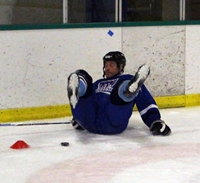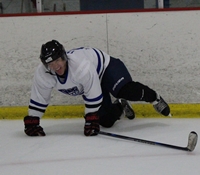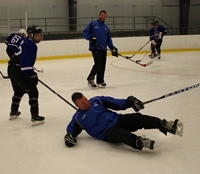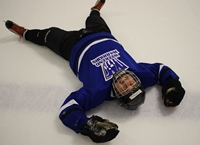Our camp season kicks off next week, and we are so excited to hit the road and spend time with our Warrior faithful, one city at a time. We love putting these camps on, primarily because we get to hang out with so many great hockey people, who have have such an incredible passion for this game. My staff and I get immense satisfaction from watching players progress from Thursday evening through Sunday morning. The level of improvement can be dramatic. We especially love it when a player has a “light bulb moment”, suddenly getting something he or she never did before. And we can’t help but smile when we see our players having more fun than an adult should be allowed to have, while getting progressively better at this great game. In order to facilitate this learning process, we have put together a few suggestions to ensure that you get the most from your camp experience. These suggestions come from our staff as well as many of our players over the years.
1) Get yourself physically prepared for camp. I don’t say this to scare anyone. You don’t need to be in triathlon shape to attend camp. Truth is, we have plenty of players show up in “marshmallow” shape, and still learn a lot at camp. But your level of physical conditioning will affect your ability to give your full effort in every drill over the course of the weekend. If you play 3 or 4 times per week or work out daily, you’re going to be in pretty good shape for the weekend. But if you play once a week, and your other form of exercise involves the TV remote control, then you may want to up your exercise regimen in the weeks leading up to camp. As coach Rob likes to say, our weekend of 12 hours on the ice is like an entire season of your beer league. So get yourself off the couch and into the gym, and you’ll be better prepared to push yourself harder and experience greater improvement.
2) Set some goals. On the Warrior Profile, we ask players about their learning goals for the weekend. Some players leave it completely blank, while others make a list of 10 or more things they want to learn. Our suggestion is that you think about 1 or 2 or possibly 3 things that you really want to improve. Make these your focus. Some may be covered as part of our regular curriculum. However, you may have a goal that is not on the curriculum. If this is the case, be sure to talk to a coach about your goal. In some cases, these are things that you can get help with off the ice. If so, there are lots of opportunities over the course of the weekend to discuss these matters with members of our staff. But often they are things that need to be learned on the ice. If this is the case, then arrange for a few minutes on the ice with one of the coaches. The coach will find a few minutes to help you out on the ice when there is an opportunity.
 3) Get out of your comfort zone. Our coaches are going to ask you to try some things on your skates that are not going to be easy. Whether it’s committing to that outside edge or learning a new pivot, you are going to be challenged to try some things that push your current limits of balance. But you’re here to get better, and you’re wearing a small fortune in protective gear. So push yourself. See how far you can commit to that edge. If you fall, your gear will protect your body, and your ego will heal quickly, as you realize that many others are in the same situation. Or maybe you can do something really well in one direction (e.g. stopping), but struggle in the other direction. Use camp as an opportunity to improve the skill on your weak side. The main idea is to push yourself a little beyond your comfort zone in order to maximize your level of improvement.
3) Get out of your comfort zone. Our coaches are going to ask you to try some things on your skates that are not going to be easy. Whether it’s committing to that outside edge or learning a new pivot, you are going to be challenged to try some things that push your current limits of balance. But you’re here to get better, and you’re wearing a small fortune in protective gear. So push yourself. See how far you can commit to that edge. If you fall, your gear will protect your body, and your ego will heal quickly, as you realize that many others are in the same situation. Or maybe you can do something really well in one direction (e.g. stopping), but struggle in the other direction. Use camp as an opportunity to improve the skill on your weak side. The main idea is to push yourself a little beyond your comfort zone in order to maximize your level of improvement.
 4) Don’t take yourself too seriously. You’re going to fall, you’re going to miss a shot; simply put you’re going to struggle in some areas that aren’t comfortable to you. That is why you came to camp. It will be natural to get frustrated, however use that frustration to keep trying. Frustration can hinder your learning experience if you let it. Whatever you do, don’t hang your head. Laugh it off, focus and get back to it. After all, we’re all in the same boat.
4) Don’t take yourself too seriously. You’re going to fall, you’re going to miss a shot; simply put you’re going to struggle in some areas that aren’t comfortable to you. That is why you came to camp. It will be natural to get frustrated, however use that frustration to keep trying. Frustration can hinder your learning experience if you let it. Whatever you do, don’t hang your head. Laugh it off, focus and get back to it. After all, we’re all in the same boat.
5) Come with an open mind – While we don’t ask you to forget everything you’ve learned, it would be beneficial to come with an open mind. For many of us, a lot of our hockey knowledge comes from the “expert” on our local league team. By expert we mean the one that yells the loudest about how much they know about the game. While some of these things may be correct, often we pick up bad habits from these folks that actually hinder our game. Our coaches have vast experience. Is everything they say gospel? Of course not. There are different ways of doing things. Sometimes it’s just a matter of trying things a different way. Just because you’ve always done something a certain way does not mean it is the best way to do it. So be open to new ideas. You’d be surprised at how many people struggle to get something one way, but then are able to do it when a coach suggests an alternative way of doing essentially the same thing.
Come with an open mind – While we don’t ask you to forget everything you’ve learned, it would be beneficial to come with an open mind. For many of us, a lot of our hockey knowledge comes from the “expert” on our local league team. By expert we mean the one that yells the loudest about how much they know about the game. While some of these things may be correct, often we pick up bad habits from these folks that actually hinder our game. Our coaches have vast experience. Is everything they say gospel? Of course not. There are different ways of doing things. Sometimes it’s just a matter of trying things a different way. Just because you’ve always done something a certain way does not mean it is the best way to do it. So be open to new ideas. You’d be surprised at how many people struggle to get something one way, but then are able to do it when a coach suggests an alternative way of doing essentially the same thing.
 6) Go slow at first. Speed does not equal effort. Hockey is a fast game, and that is part of what makes it so exciting. We all want to be able to duplicate what we see the pros do on TV. But remember, those guys have been doing that almost every day since they were mini-mites. We see too many players come to camp, learn a new skill, and try to execute it too fast. It takes a while to train your brain to do it right. So while the ultimate goal may be to do it fast, the most important thing is to do it right. So whether it is a new stick handling move or a new skating stride, do it slowly and with good technique. Once you get the proper technique down, the increased speed will come with repetition.
6) Go slow at first. Speed does not equal effort. Hockey is a fast game, and that is part of what makes it so exciting. We all want to be able to duplicate what we see the pros do on TV. But remember, those guys have been doing that almost every day since they were mini-mites. We see too many players come to camp, learn a new skill, and try to execute it too fast. It takes a while to train your brain to do it right. So while the ultimate goal may be to do it fast, the most important thing is to do it right. So whether it is a new stick handling move or a new skating stride, do it slowly and with good technique. Once you get the proper technique down, the increased speed will come with repetition.
I hope you’ll keep these tips in mind when you come to camp. We want to see you get the absolute most possible from your camp experience. We will surround you with coaches who are knowledgeable, experienced and passionate about teaching you to be a better player. Your job is to be the best sponge you can be, and take your game to the next level!
